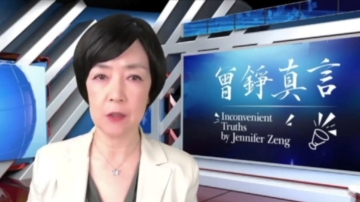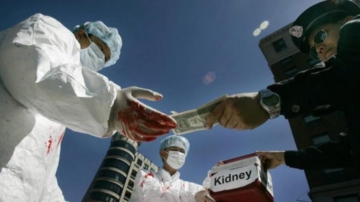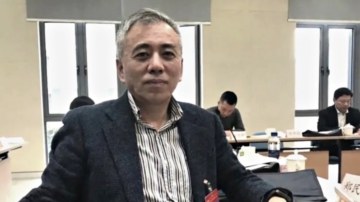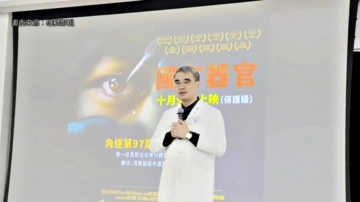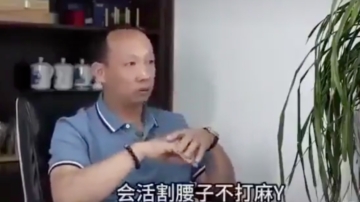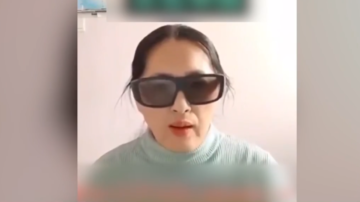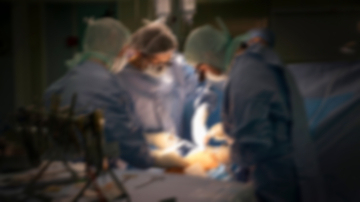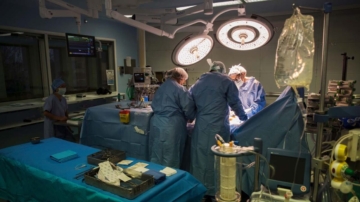【新唐人2012年9月14日訊】一宗號稱中國至今最大非法買賣人體器官的案件,日前被大陸媒體揭露出來。其中,涉及北京的解放軍304醫院。不過,外界指出,中共自己揭露這種極少量的黑市犯罪行為,是為了掩蓋中共體制真正的犯罪行為。
9月10號出版的《財經》雜誌,揭露了這宗非法買賣人體器官的案件。這起案件涉及51顆活體腎臟,涉案金額超過1000萬元,被起訴的16名被告包括組織者、仲介、掮客和醫護人員,知名的軍方醫院----北京解放軍304醫院也牽涉其中。
304醫院是部隊三甲軍醫院,有正規器官移植手術資質。報導說,在醫院泌尿科主任葉林陽的助力下,把「黑市」器官成功「洗白」。
《財經》雜誌還透露,犯罪團夥的「腎源」,有的是從賣腎者那裡「摘除」的,還有的是從法院出賣死刑犯腎臟後,買得的。
不過,時事評論員藍述認為,現在中共自曝一些黑市活體摘除人體器官買賣,其實是「擾人視聽」,目地是掩蓋中共體制真正的犯罪行為。
時事評論員 藍述:「當局處理一些這種小的、屬於刑事犯罪範疇的這種非法器官買賣,它回答不了那種大規模的器官買賣的來源在甚麼地方。這種大規模的器官買賣,它的整個過程怎麼樣的,這東西他回答不了。」
中國衛生部資料顯示,中國每年器官移植手術數量,從1999年的幾百起發展到2008年的一萬多起。
但是,根據「大赦國際」組織的記錄,在2000年和2005年之間,中國大陸死刑犯的處決數量平均每年1,616人,而死囚器官還受「組織配型」、「冷缺血時間」等多項限制,利用率不超過30%。中國紅十字會統計,中國親屬活體捐獻率僅為1.1%,死者捐助器官的比例是百萬分之0.03。
「訴江第一人」 朱柯明:「活摘器官大面出現的時候,正好是中共迫害法輪功時期,它這個是和法輪功有緊密關係的,和迫害法輪功的政策有緊密關係的。江澤民說『肉體上滅絕,名譽上搞臭,經濟上搞垮』。這是江澤民迫害法輪功的三個主要政策。」
2006 年7月6號日,加拿大人權律師麥塔斯和前國會議員、人權活動家喬高發表了第一份《關於調查指控中共摘取法輪功學員器官的報告》。報告得出的結論是,從 2000年開始,活體摘取法輪功學員器官的罪惡一直髮生,而且遍及全中國。他們認為,至少4萬名失蹤的法輪功學員與器官移植有關聯。
9月12號,美國反強摘器官醫生協會(Doctors Against Forced Organ Harvesting)發言人諾託(Damon Noto)表示,2000年後,中國器官移植數量以指數般爆炸式發展,並且能夠在極短時間內為患者找到器官,說明中國有一個巨大的活體器官庫。諾託指出,1999年開始,中共政權迫害法輪功及迫害的嚴酷程度,正好與中國器官移植的迅速增長相吻合,活摘法輪功修煉者器官的事實已被多位研究者、外科醫生及中共高層官員證實。
從第一個控告江澤民迫害法輪功,反被關進監獄5年的朱柯明的經歷,也說明問題。
「訴江第一人」 朱柯明:「我專門問過和我們在一起其他類型的犯人,他們以前也檢查身體,但他們是寫名字的,甚麼甚麼名字那樣的。然而來講,他打著給所有犯人檢查身體的名義,也給我們檢查身體,然後真正挨個細檢查的都是我們法輪功學員,而且都是編號的,不寫名字。」
朱柯明從監獄出來以後,了解到有活摘法輪功器官這個事情,他明白了他也曾經成了被活摘器官的「候選人」。
朱柯明指出,中共的鎮壓政策導致無數法輪功學員的器官被活摘,這是「體制的犯罪」,不是個別人能幹得了的。
藍述認為,是到了徹底曝光和制止 「這個星球上從未有過的罪惡」的時候了。
採訪/朱智善 編輯/宋風 後製/王明宇
PLA Involved in Organ Trading
A large illegal trade in human organs in China has recently
been exposed by Chinese media.
It involves the People's Liberation Army (PLA) 304 Hospital
in Beijing. However, the outside world pointed out that
the Chinese Communist Party (CCP) exposed a few black
market crimes in order to cover up the real crime of the CCP system.
On September 10 Finance magazine exposed
the illegal trade of human organs case.
This case involved 51 living kidney transplantations,
totaling RMB 10 million.
16 defendants include organizers, intermediaries, brokers,
and health care workers,
as well as the well-known military hospital,
Beijing PLA 304 Hospital, are involved.
304 hospital is an AAA military hospital with formal organ
transplant qualifications.
The report said with the help of Ye Linyang,
they successfully ‘washed white’ the ‘black market organs.’
Finance magazine also revealed these kidneys were obtained
from organ sellers, or purchased kidneys of executed criminals in court.
Political commentator Lan Shu said now the CCP admits
some human organ trading took place on the black market,
which actually disturbs the public view and
covers up their real crimes.
Lan Shu: "The authorities only addressed
small illegal organ harvesting crimes,
which doesn’t explain the sources of a large-scale organ
trading and its process.”
The Chinese Ministry of Health data shows that the number
of organ transplants in China developed from a few hundred cases in 1999 to more than 10,000 cases in 2008.
According to Amnesty International records, from 2000 to 2005,
the number of executions in China was 1,616 on average every year.
And the organs from executed prisoners was also affected
by a number of limitations like ‘tissue types’ and ‘cold ischemic time.’
The utilization rate is lower than 30%, statistics show, while
the living donors by relatives in China counts only 1.1%,
and deceased organ donors account for only 0.03 in a million.
Zhu Keming, the 1st person who sued Jiang Zemin:
"When organ harvesting took place on a large scale,
it was precisely the period during
the persecution of Falun Gong.
It is closely related to Falun Gong and the persecution policy.
Jiang said to ‘kill, smear and economically destroy Falun Gong
practitioners’, which are the three main policies of Jiang’s persecution.”
On July 6, 2006, David Matas, the Canadian human rights
lawyer and former member of Congress,
along with human rights activist Mr. Kilgour,
published the first report investigating allegations that the CCP harvested Falun Gong practitioners' organs.
The report concluded that, since 2000, organ harvesting from
living Falun Gong practitioners have been taking place all over China.
They believe at least 40,000 missing Falun Gong practitioners
were victims related to organ harvesting.
On September 12, Damon Noto, the spokesman of Doctors
Against Forced Organ Harvesting, said that after 2000,
the number of organ transplants in China had explosive
exponential development.
An appropriate organ could be found within a short time,
which shows there is a large living organ pool in China.
Noto pointed out that since 1999, the severe persecution
of Falun Gong coincided with the fast growth of organ transplants.
Organ harvesting from living Falun Gong practitioners had
been approved by many investigators, surgeons, and high ranking CCP officials.
Knowing the experience of Zhu Keming, who had once been
detained for five years, and is the first person to sue Jiang Zemin,
for the persecution of Falun Gong,
we can also figure out the problem.
Zhu Keming: "We asked other criminals who said
they were required to undergo physical examinations, too, using their names.
However, in the name of physical examinations
a requirement for criminals, Falun Gong practitioners were also examined with extra care.
The practitioners assigned numbers for identification purposes
and their names weren’t used.”
Upon release from prison, Zhu Keming learned about
the organ harvesting from living Falun Gong practitioners
and then realized he once was a candidate for organ
harvesting.
Zhu Keming pointed out the suppression policies of the CCP
led to organ harvesting from numerous Falun Gong practitioners,
which is an institutional crime, not one that
an individual could accomplish.
Lan Shu said it is time to completely expose and
stop this never before seen evil.
9月10號出版的《財經》雜誌,揭露了這宗非法買賣人體器官的案件。這起案件涉及51顆活體腎臟,涉案金額超過1000萬元,被起訴的16名被告包括組織者、仲介、掮客和醫護人員,知名的軍方醫院----北京解放軍304醫院也牽涉其中。
304醫院是部隊三甲軍醫院,有正規器官移植手術資質。報導說,在醫院泌尿科主任葉林陽的助力下,把「黑市」器官成功「洗白」。
《財經》雜誌還透露,犯罪團夥的「腎源」,有的是從賣腎者那裡「摘除」的,還有的是從法院出賣死刑犯腎臟後,買得的。
不過,時事評論員藍述認為,現在中共自曝一些黑市活體摘除人體器官買賣,其實是「擾人視聽」,目地是掩蓋中共體制真正的犯罪行為。
時事評論員 藍述:「當局處理一些這種小的、屬於刑事犯罪範疇的這種非法器官買賣,它回答不了那種大規模的器官買賣的來源在甚麼地方。這種大規模的器官買賣,它的整個過程怎麼樣的,這東西他回答不了。」
中國衛生部資料顯示,中國每年器官移植手術數量,從1999年的幾百起發展到2008年的一萬多起。
但是,根據「大赦國際」組織的記錄,在2000年和2005年之間,中國大陸死刑犯的處決數量平均每年1,616人,而死囚器官還受「組織配型」、「冷缺血時間」等多項限制,利用率不超過30%。中國紅十字會統計,中國親屬活體捐獻率僅為1.1%,死者捐助器官的比例是百萬分之0.03。
「訴江第一人」 朱柯明:「活摘器官大面出現的時候,正好是中共迫害法輪功時期,它這個是和法輪功有緊密關係的,和迫害法輪功的政策有緊密關係的。江澤民說『肉體上滅絕,名譽上搞臭,經濟上搞垮』。這是江澤民迫害法輪功的三個主要政策。」
2006 年7月6號日,加拿大人權律師麥塔斯和前國會議員、人權活動家喬高發表了第一份《關於調查指控中共摘取法輪功學員器官的報告》。報告得出的結論是,從 2000年開始,活體摘取法輪功學員器官的罪惡一直髮生,而且遍及全中國。他們認為,至少4萬名失蹤的法輪功學員與器官移植有關聯。
9月12號,美國反強摘器官醫生協會(Doctors Against Forced Organ Harvesting)發言人諾託(Damon Noto)表示,2000年後,中國器官移植數量以指數般爆炸式發展,並且能夠在極短時間內為患者找到器官,說明中國有一個巨大的活體器官庫。諾託指出,1999年開始,中共政權迫害法輪功及迫害的嚴酷程度,正好與中國器官移植的迅速增長相吻合,活摘法輪功修煉者器官的事實已被多位研究者、外科醫生及中共高層官員證實。
從第一個控告江澤民迫害法輪功,反被關進監獄5年的朱柯明的經歷,也說明問題。
「訴江第一人」 朱柯明:「我專門問過和我們在一起其他類型的犯人,他們以前也檢查身體,但他們是寫名字的,甚麼甚麼名字那樣的。然而來講,他打著給所有犯人檢查身體的名義,也給我們檢查身體,然後真正挨個細檢查的都是我們法輪功學員,而且都是編號的,不寫名字。」
朱柯明從監獄出來以後,了解到有活摘法輪功器官這個事情,他明白了他也曾經成了被活摘器官的「候選人」。
朱柯明指出,中共的鎮壓政策導致無數法輪功學員的器官被活摘,這是「體制的犯罪」,不是個別人能幹得了的。
藍述認為,是到了徹底曝光和制止 「這個星球上從未有過的罪惡」的時候了。
採訪/朱智善 編輯/宋風 後製/王明宇
PLA Involved in Organ Trading
A large illegal trade in human organs in China has recently
been exposed by Chinese media.
It involves the People's Liberation Army (PLA) 304 Hospital
in Beijing. However, the outside world pointed out that
the Chinese Communist Party (CCP) exposed a few black
market crimes in order to cover up the real crime of the CCP system.
On September 10 Finance magazine exposed
the illegal trade of human organs case.
This case involved 51 living kidney transplantations,
totaling RMB 10 million.
16 defendants include organizers, intermediaries, brokers,
and health care workers,
as well as the well-known military hospital,
Beijing PLA 304 Hospital, are involved.
304 hospital is an AAA military hospital with formal organ
transplant qualifications.
The report said with the help of Ye Linyang,
they successfully ‘washed white’ the ‘black market organs.’
Finance magazine also revealed these kidneys were obtained
from organ sellers, or purchased kidneys of executed criminals in court.
Political commentator Lan Shu said now the CCP admits
some human organ trading took place on the black market,
which actually disturbs the public view and
covers up their real crimes.
Lan Shu: "The authorities only addressed
small illegal organ harvesting crimes,
which doesn’t explain the sources of a large-scale organ
trading and its process.”
The Chinese Ministry of Health data shows that the number
of organ transplants in China developed from a few hundred cases in 1999 to more than 10,000 cases in 2008.
According to Amnesty International records, from 2000 to 2005,
the number of executions in China was 1,616 on average every year.
And the organs from executed prisoners was also affected
by a number of limitations like ‘tissue types’ and ‘cold ischemic time.’
The utilization rate is lower than 30%, statistics show, while
the living donors by relatives in China counts only 1.1%,
and deceased organ donors account for only 0.03 in a million.
Zhu Keming, the 1st person who sued Jiang Zemin:
"When organ harvesting took place on a large scale,
it was precisely the period during
the persecution of Falun Gong.
It is closely related to Falun Gong and the persecution policy.
Jiang said to ‘kill, smear and economically destroy Falun Gong
practitioners’, which are the three main policies of Jiang’s persecution.”
On July 6, 2006, David Matas, the Canadian human rights
lawyer and former member of Congress,
along with human rights activist Mr. Kilgour,
published the first report investigating allegations that the CCP harvested Falun Gong practitioners' organs.
The report concluded that, since 2000, organ harvesting from
living Falun Gong practitioners have been taking place all over China.
They believe at least 40,000 missing Falun Gong practitioners
were victims related to organ harvesting.
On September 12, Damon Noto, the spokesman of Doctors
Against Forced Organ Harvesting, said that after 2000,
the number of organ transplants in China had explosive
exponential development.
An appropriate organ could be found within a short time,
which shows there is a large living organ pool in China.
Noto pointed out that since 1999, the severe persecution
of Falun Gong coincided with the fast growth of organ transplants.
Organ harvesting from living Falun Gong practitioners had
been approved by many investigators, surgeons, and high ranking CCP officials.
Knowing the experience of Zhu Keming, who had once been
detained for five years, and is the first person to sue Jiang Zemin,
for the persecution of Falun Gong,
we can also figure out the problem.
Zhu Keming: "We asked other criminals who said
they were required to undergo physical examinations, too, using their names.
However, in the name of physical examinations
a requirement for criminals, Falun Gong practitioners were also examined with extra care.
The practitioners assigned numbers for identification purposes
and their names weren’t used.”
Upon release from prison, Zhu Keming learned about
the organ harvesting from living Falun Gong practitioners
and then realized he once was a candidate for organ
harvesting.
Zhu Keming pointed out the suppression policies of the CCP
led to organ harvesting from numerous Falun Gong practitioners,
which is an institutional crime, not one that
an individual could accomplish.
Lan Shu said it is time to completely expose and
stop this never before seen evil.

